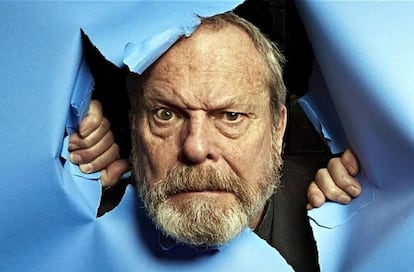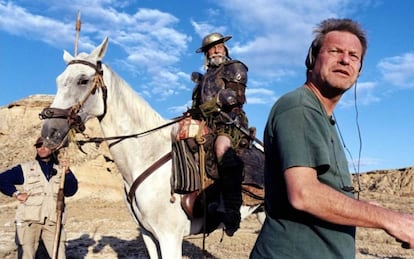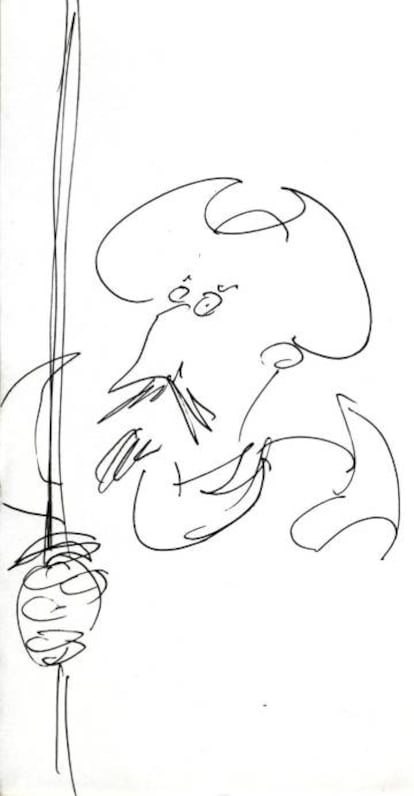Terry Gilliam in Spain to finish ill-fated Don Quixote movie... yet again
Monty Python co-founder has been trying to complete this project since 2000, to no avail

The history of filmmaking is rife with ill-fated projects. But there is little doubt that one of the most famous examples is Terry Gilliam’s attempt at filming his own version of Cervantes’ timeless novel Don Quixote.

In a 2016 interview with EL PAÍS on the occasion of the Spanish-language release of his autobiography, Gilliamesque, Gilliam stated: “Making my version of Don Quixote is a medical obligation. It is a brain tumor that I have to extirpate no matter what.”
For decades, one of the co-founders of the comedy classic Monty Python’s Flying Circus has been nurturing a script that he keeps rewriting on and off. Filming for The Man Who Killed Don Quixote even began in 2000, in northern Spain’s Bardenas Reales desert, normally an arid place – until heavy flooding suddenly turned it into a landscape of mud.
Don Quixote is highly dangerous for any adapter, because you end up becoming the character
Terry Gilliam, film director
As if that were not enough, filming was further affected by the deafening roar of NATO fighter jets performing exercises at a nearby shooting range. And to top it all off, the actor in the leading role, Jean Rochefort, suffered a slipped disc that ruled out any scenes on horseback. Shooting ended six days after it had begun. The full horror of that doomed endeavor was captured in the 2002 documentary Lost in La Mancha.
Since then, Gilliam has come more or less close to getting the project back on its feet. Amazon produced another attempt, but it was halted when the lead actor, John Hurt, was diagnosed with pancreatic cancer.
In April of last year, Portuguese producer Paolo Branco, who got behind a new attempt at shooting Gilliam’s project, told EL PAÍS: “A lot of people are awaiting this extraordinary and absolutely modern version of what Don Quixote represents, and I love the idea that we are filming it during the 400th anniversary of Cervantes’ death.”

The project was even formally presented at Cannes, where Adam Driver and Michael Palin were announced as the new lead actors. Gilliam had found the locations he wanted in Spain and Portugal. The budget was now €16 million, down from €21 million in 2000.
But by the fall, Branco had walked out on the project in what Gilliam called “the Portuguese episode.” Yet Adam Driver insisted that the project was still on track. Slowly, new names were added to the cast: Oscar Jaenada, Rossy de Palma, Olga Kurylenko and Stellan Skarsgård. Soon after Christmas, this reporter ran into Gilliam at a supermarket in Madrid, where the director was working on pre-production.

Filming finally began two weeks ago, with the Spanish production company Tornasol now behind the project. The script has been altered over the years: the character of Toby (originally played by Johnny Depp, then Ewan McGregor, then Jack O’Connell and now Adam Driver) used to be a young idealistic filmmaker who wanted to make his own Don Quixote movie in a Spanish village.
In the latest version of the story, Toby has become an arrogant advertising executive who goes to Spain to shoot a commercial. A Gypsy man shows up with a copy of the film he made during his student days. Toby returns to the village where he shot the movie, and reunites with the old man who once played Don Quixote (originally Jean Rochefort, then Robert Duvall, then Michael Palin, and now Jonathan Pryce). But the latter has gone mad, believing he is the real Don Quixote, and he gets Toby mixed up with Sancho Panza, Don Quixote’s faithful sidekick. For different reasons, both men eventually set out on a journey to find the beautiful Dulcinea.
The shoot is taking place in Toledo, in Navarre – the castle of Olite is one of the most important locations – and on the island of Lanzarote.
Like Gilliam told EL PAÍS in June of last year: “Don Quixote is highly dangerous for any adapter, because you end up becoming the character. And you live in a world that is not your world.”
To the maker of The Fisher King, 12 Monkeys and Fear and Loathing in Las Vegas, making The Man Who Killed Don Quixote has become an obsession. He says that movies can have the same effect on people as the chivalry novels had on Don Quixote.
He should know.
English version by Susana Urra.
Tu suscripción se está usando en otro dispositivo
¿Quieres añadir otro usuario a tu suscripción?
Si continúas leyendo en este dispositivo, no se podrá leer en el otro.
FlechaTu suscripción se está usando en otro dispositivo y solo puedes acceder a EL PAÍS desde un dispositivo a la vez.
Si quieres compartir tu cuenta, cambia tu suscripción a la modalidad Premium, así podrás añadir otro usuario. Cada uno accederá con su propia cuenta de email, lo que os permitirá personalizar vuestra experiencia en EL PAÍS.
¿Tienes una suscripción de empresa? Accede aquí para contratar más cuentas.
En el caso de no saber quién está usando tu cuenta, te recomendamos cambiar tu contraseña aquí.
Si decides continuar compartiendo tu cuenta, este mensaje se mostrará en tu dispositivo y en el de la otra persona que está usando tu cuenta de forma indefinida, afectando a tu experiencia de lectura. Puedes consultar aquí los términos y condiciones de la suscripción digital.








































